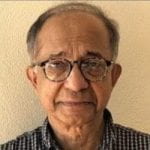Wednesday, February 2nd, 2022
We were pleased to invite you to a joint Elliott School Book Launch Series and IIEP Envisioning India event on Wednesday, February 2nd to discuss Unshackling India. This event featured authors Ajay Chhibber and Salman Soz with discussant remarks by Kaushik Basu (Cornell University), and Martin Wolf (Financial Times). This webinar was moderated by Elliott School Dean Alyssa Ayres, and Elliott School Vice Dean James Foster provided welcoming remarks.
This was the launch of Ajay Chhibber and Salman Anees Soz’s book Unshackling India: Hard Truths and Clear Choices for Economic Revival.
As India enters its seventy-fifth year of independence, conventional policy is unlikely to combat the breadth of its economic challenges. Across a range of areas—human capital, technology, agriculture, finance, trade, public-service delivery and more—new ideas must now be on the table. The COVID-19 pandemic has not only cost India many lives and livelihoods, it has also exposed major structural weaknesses in the economy.
A huge farm and jobs crisis, rising and massive inequalities, tepid investment growth and chronic banking-sector challenges have plagued the economy for many years. The pandemic has exacerbated these challenges. It has also exposed the limitations of the Indian state, which tries to control too much—and ends up stifling the economy and the inherent energies of its young population. Climate change is no longer a distant threat, while disruptive technology has huge implications for India’s demographic dividend. In addition, the dangerous lurch towards majoritarianism will cast its shadow on India’s pursuit of prosperity for all.
Unshackling India examines the question: Can India use the next twenty-five years, when it will reach the hundredth year of independence, to not only restructure its economy but rejuvenate its democratic energy and unshackle its potential and become a genuinely developed economy by 2047? This book argues that India can foster a prosperous and inclusive economy if it sets its mind to it, acknowledges the hard truths and lays out the clear choices and new ideas India must adopt towards that end.
Welcoming Remarks:
 James Foster is the Oliver T. Carr, Jr. Professor of International Affairs, Professor of Economics, and Co-Director of the Institute for International Economic Policy at the George Washington University. He is also a Research Associate at the Oxford Poverty and Human Development Initiative at Oxford University. Professor Foster’s research focuses on welfare economics — using economic tools to evaluate and enhance the wellbeing of people. His work underlies many well-known social indices including the global Multidimensional Poverty Index (MPI) published annually by the UNDP in the Human Development Report, dozens of national MPIs used to guide domestic policy against poverty, the Women’s Empowerment in Agriculture Index (WEAI) at USAID, the Gross National Happiness Index of Bhutan, the Better Jobs Index of the InterAmerican Development Bank, and the Statistical Performance Index of the World Bank. Prof. Foster received his PhD in Economics from Cornell University and has a Doctorate Honoris Causa from Universidad Autónoma del Estado Hidalgo (Mexico).
James Foster is the Oliver T. Carr, Jr. Professor of International Affairs, Professor of Economics, and Co-Director of the Institute for International Economic Policy at the George Washington University. He is also a Research Associate at the Oxford Poverty and Human Development Initiative at Oxford University. Professor Foster’s research focuses on welfare economics — using economic tools to evaluate and enhance the wellbeing of people. His work underlies many well-known social indices including the global Multidimensional Poverty Index (MPI) published annually by the UNDP in the Human Development Report, dozens of national MPIs used to guide domestic policy against poverty, the Women’s Empowerment in Agriculture Index (WEAI) at USAID, the Gross National Happiness Index of Bhutan, the Better Jobs Index of the InterAmerican Development Bank, and the Statistical Performance Index of the World Bank. Prof. Foster received his PhD in Economics from Cornell University and has a Doctorate Honoris Causa from Universidad Autónoma del Estado Hidalgo (Mexico).
About the Moderator:
 Alyssa Ayres is the Dean of the Elliott School of International Affairs at George Washington University. Her work focuses primarily on India’s role in the world and on U.S. relations with South Asia in the larger Indo-Pacific. Before joining the Elliott School, she was a Senior Fellow at the Council on Foreign Relations, and Deputy Assistant Secretary of State for South Asia under the Obama administration. She holds a Ph.D. in South Asian Languages and Civilizations from the University of Chicago.
Alyssa Ayres is the Dean of the Elliott School of International Affairs at George Washington University. Her work focuses primarily on India’s role in the world and on U.S. relations with South Asia in the larger Indo-Pacific. Before joining the Elliott School, she was a Senior Fellow at the Council on Foreign Relations, and Deputy Assistant Secretary of State for South Asia under the Obama administration. She holds a Ph.D. in South Asian Languages and Civilizations from the University of Chicago.
About the Speakers:
 Ajay Chhibber is Distinguished Visiting Scholar, Institute for International Economic Policy, George Washington University and Non-Resident Senior Fellow at the Atlantic Council. He was the first Director General, Independent Evaluation Office, India, and Distinguished Visiting Professor at the NIPFP. He served as Assistant Secretary General, UN, and Assistant Administrator, UNDP. At the World Bank he served as Country Director in Turkey and Vietnam, and Director of the 1997 World Development Report. He has a PhD from Stanford University, an MA from the Delhi School of Economics and was awarded the David Rajaram Prize for best all-rounder at St. Stephen’s College, Delhi University.
Ajay Chhibber is Distinguished Visiting Scholar, Institute for International Economic Policy, George Washington University and Non-Resident Senior Fellow at the Atlantic Council. He was the first Director General, Independent Evaluation Office, India, and Distinguished Visiting Professor at the NIPFP. He served as Assistant Secretary General, UN, and Assistant Administrator, UNDP. At the World Bank he served as Country Director in Turkey and Vietnam, and Director of the 1997 World Development Report. He has a PhD from Stanford University, an MA from the Delhi School of Economics and was awarded the David Rajaram Prize for best all-rounder at St. Stephen’s College, Delhi University.
 Salman Soz is an economic development consultant, author and commentator. He has extensive international experience across a range of economic development issues. Formerly with the World Bank, he now serves as a consultant to international institutions. He is a recipient of the World Bank President’s Award for Excellence. His commentary appears in a variety of media outlets and he speaks regularly on politics, economics, and international affairs. He has an MBA from Yale University, an MA in Economics from Northeastern University, and a BA (Hons) in Economics from St. Stephen’s College, where he was the President of the Students’ Union Society.
Salman Soz is an economic development consultant, author and commentator. He has extensive international experience across a range of economic development issues. Formerly with the World Bank, he now serves as a consultant to international institutions. He is a recipient of the World Bank President’s Award for Excellence. His commentary appears in a variety of media outlets and he speaks regularly on politics, economics, and international affairs. He has an MBA from Yale University, an MA in Economics from Northeastern University, and a BA (Hons) in Economics from St. Stephen’s College, where he was the President of the Students’ Union Society.
About the Discussants:
 Kaushik Basu is Professor of Economics and Carl Marks Professor of International Studies at Cornell University. He is currently the President of the International Economic Association and a nonresident senior fellow in the Global Economy and Development program at the Brookings Institution. He recently served as Chief Economist at the World Bank and before that was Chief Economic Adviser to the Government of India. During his tenure at the Bank, he regularly co-taught an Elliott School course Game Theory and Strategic Thinking with James Foster, which included a class session in the Preston Auditorium of the World Bank for its 150 GW students. As one student commented “Being taught by Prof. Basu was definitely an Only at GW moment!” He has now returned to Cornell but fondly remembers his time in DC – especially his weekly chats with GW students and his daily strolls across the GW campus from home to work in the Bank, and back again.
Kaushik Basu is Professor of Economics and Carl Marks Professor of International Studies at Cornell University. He is currently the President of the International Economic Association and a nonresident senior fellow in the Global Economy and Development program at the Brookings Institution. He recently served as Chief Economist at the World Bank and before that was Chief Economic Adviser to the Government of India. During his tenure at the Bank, he regularly co-taught an Elliott School course Game Theory and Strategic Thinking with James Foster, which included a class session in the Preston Auditorium of the World Bank for its 150 GW students. As one student commented “Being taught by Prof. Basu was definitely an Only at GW moment!” He has now returned to Cornell but fondly remembers his time in DC – especially his weekly chats with GW students and his daily strolls across the GW campus from home to work in the Bank, and back again.
 Martin Wolf CBE is Chief Economics Commentator at the Financial Times, London. He was awarded the CBE (Commander of the British Empire) in 2000. He was a member of the UK government’s Independent Commission on Banking between June 2010 and September 2011. He is an honorary fellow of Nuffield College, Oxford and King’s College, London. He has received honorary doctorates from six universities, including the London School of Economics. He is a University Global Fellow of Columbia University, New York. Mr Wolf won the Ludwig Erhard Prize for economic commentary for 2009, the 33rd Ischia International Journalism Prize in 2012, the Overseas Press Club of America’s prize for “best commentary on international news in any medium” for 2013 and the 2019 Lifetime Achievement Award at the Gerald Loeb Awards. His most recent book is The Shifts and The Shocks: What we’ve learned – and have still to learn – from the financial crisis.
Martin Wolf CBE is Chief Economics Commentator at the Financial Times, London. He was awarded the CBE (Commander of the British Empire) in 2000. He was a member of the UK government’s Independent Commission on Banking between June 2010 and September 2011. He is an honorary fellow of Nuffield College, Oxford and King’s College, London. He has received honorary doctorates from six universities, including the London School of Economics. He is a University Global Fellow of Columbia University, New York. Mr Wolf won the Ludwig Erhard Prize for economic commentary for 2009, the 33rd Ischia International Journalism Prize in 2012, the Overseas Press Club of America’s prize for “best commentary on international news in any medium” for 2013 and the 2019 Lifetime Achievement Award at the Gerald Loeb Awards. His most recent book is The Shifts and The Shocks: What we’ve learned – and have still to learn – from the financial crisis.
The Envisioning India series is organized under the stewardship of IIEP Director Jay Shambaugh, Professor of International Affairs and Professor of Economics, and IIEP Distinguished Visiting Scholar Ajay Chhibber.
